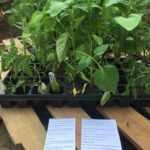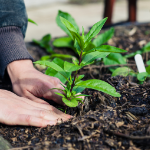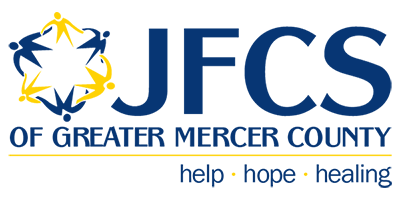 Through two recent donations, JFCS is growing a program within our food pantry to encourage and empower clients to grow their own food. Recently, the agency was able to provide tomato plant seedlings to clients. JFCS agency has a relationship with Abe’s Acres Farm, located in Hightstown, where agency staff bring specific cardboard waste – collected through regular, large-scale food deliveries to the pantry – to the farm which is turned into composting material. In early May, when dropping off cardboard, Abe’s Acres provided 200 tomato plant seedlings for JFCS to share with pantry clients.
Through two recent donations, JFCS is growing a program within our food pantry to encourage and empower clients to grow their own food. Recently, the agency was able to provide tomato plant seedlings to clients. JFCS agency has a relationship with Abe’s Acres Farm, located in Hightstown, where agency staff bring specific cardboard waste – collected through regular, large-scale food deliveries to the pantry – to the farm which is turned into composting material. In early May, when dropping off cardboard, Abe’s Acres provided 200 tomato plant seedlings for JFCS to share with pantry clients.
Through an ongoing partnership with ONEProject, a Robbinsville-based organization, JFCS also received a donation of 250 painted planters and more seeds to provide our clients with additional resources.
 Why encourage clients to grow their own food?
Why encourage clients to grow their own food?
Our clients are food insecure and low-income. One of the most basic advantages of growing one’s own produce is that it allows more, nutritious food to get onto the tables while saving money.
Food pantries face significant challenges in acquiring perishable foods, especially produce, even when they have the means to keep these items stocked. The JFCS pantry houses multiple full-sized refrigerators and freezers as well as having refrigeration and freezer storage available on both mobile food pantry vehicles. Despite this, even our agency faces challenges when trying to keep fresh items stocked in the volume needed to service all our clients through both the on-site and mobile food pantries. By providing resources directly to clients, we can circumvent many of those challenges and allow the client to have food from the freshest and most primary source – the plant!
The Importance of Access to Fresh Produce
In a 2019 study by the CDC, 85% of food pantry clients said it was important to have fresh fruits and vegetables, but only 52% said these were always available. Food pantry clients’ fruit and vegetable consumption falls short of recommendations. In the same CDC study, about two-thirds of food pantry clients had a household member with a diet-related chronic disease. Poor nutrition can lead to increased risk for developing diet-related health conditions.
JFCS prides itself on being a healthy, choice-pantry, but there is always room to improve. By encouraging donations from community members through their own gardens and giving our clients the tools to grow their own food, we are taking our healthy, choice-pantry to the next level.
More than Fruits & Veggies
The ONE Project donation included cilantro seeds. Herbs and spices are often overlooked as donations to food pantries but are essential for clients to secure their cultural foodways. By giving a planter or seed to grow an herb, our clients can choose what they want to grow beyond anything provided through our pantry.
 How Can You Help?
How Can You Help?
JFCS is tying into the national Plant-a-Row initiative which encourages individuals to plant items in their personal or communal gardens for the specific purpose of harvesting to donate to local food pantries.
The JFCS food pantry will accept donations from local gardens to be provided to our clients. In years past, the JFCS pantry has been able to accept limited donations of fresh produce but now with the mobile food pantry going out 3-5 times per week, there is significantly increased demand for a variety of fresh fruits and vegetables. The on-site food pantry also continues to see high use, with 80-100 visits per month.
If you have questions about donating from your personal or community garden, reach out to Taryn Krietzman at TarynK@jfcsonline.org. For those outside of the Mercer County region, individuals can utilize the pantry finder on AmpleHarvest.com to locate a local food pantry accepting donations from personal or community gardens.
Taryn Krietzman, RDN


